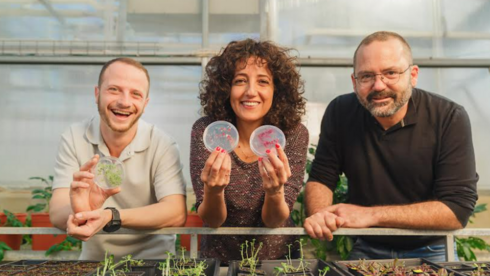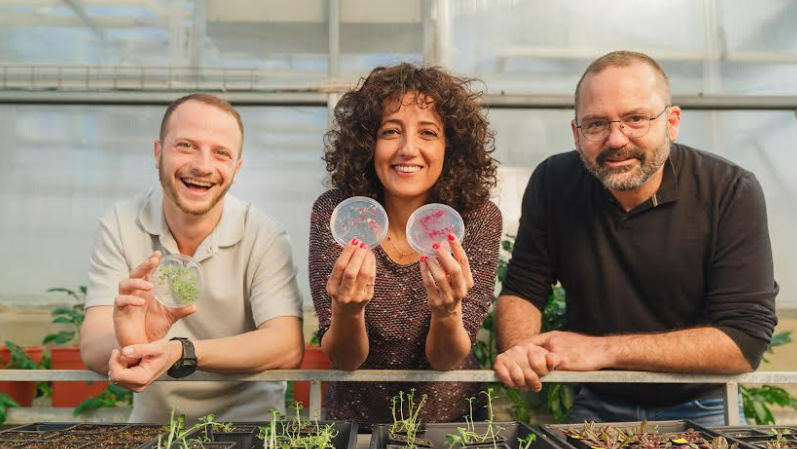
Boarding Pass
Israeli startup raises $2.4 million to be the “Pfizer” of crop seed innovation
GeneNeer develops expedited, precisely-controlled gene editing and rapid gene discovery to support global food security and nutrition.
“Because climate change is having an impact on agriculture worldwide – but uniquely in each region and for each crop – I believe there is a tremendous advantage to developing a solution that facilitates rapid crop seed development,” explained Dr. Kinneret Shefer, CEO and Co-founder of GeneNeer.
The company, founded in 2016, recently raised $1 million for its method of gene editing for smart, fast crop breeding. Today the company is mainly focused on potato production but hopes to expand to other crops in the future.
1 View gallery


Members of GeneNeer's R&D Team
(Photo: Benny Gamzo. Used with permission from GeneNeer.)
“I want GeneNeer to be the “Pfizer” of crop seed innovation. When a new virus or pest emerges that impacts crops, I want GeneNeer to be the solution everyone turns to for the development of a more resilient crop seed, ensuring healthy growth and prosperity, to prevent the spread of viruses, fungi, and pests that will reduce crop yield over several years,” she added.
You can learn more about the company below.
Company Name: GeneNeer Ltd.
Sector: AgriTech
Product/Service description:
GeneNeer is engaged in the enhancement of crops through the development of innovative methods for expedited, precisely-controlled gene editing and rapid gene discovery, using its patent-protected Superlines and tissue-specific silencing. The company aims to use its capabilities to support global food security and nutrition.
GeneNeer’s technology facilitates the creation of Superlines of leading crop varieties, at the tissue-culture level, which serve as innovation platforms. This eliminates the need for crossing or single-cell assays, both speeding and simplifying enhanced crop seed development. Once created, seed developers or GeneNeer can modify traits on Superlines – with unprecedented control, safety and speed (months, rather than years) – then completely remove the gene-editing machinery, preventing undesirable off-target events.
Already engaged in a paid collaboration with a Tier 1 company, GeneNeer is interested in partnering with Tier-1 and Tier-2 Crop Seed Breeders and Innovators; major Potato producers, processors and brands; researchers and other interested parties to leverage its know-how.
GeneNeer is a participant in the prestigious StartLife program for promising AgriTech startups, affiliated with the Wageningen University in The Netherlands.
Founder Bios:
Dr. Kinneret Shefer, CEO and Co-founder: An innovative, data-driven and entrepreneurial researcher with expertise in molecular biology, genetic biology and gene engineering. She earned a PhD in Genetics (Hebrew University of Jerusalem) and a Post-doctoral Fulbright Scholarship (University of California Santa Cruz), focusing on RNA Structure and Function.
Prof. Oded Shoseyov, Co-founder and Chairman: A Professor at the Hebrew University of Jerusalem’s Robert H. Smith Faculty of Agriculture, Food and Environment, an expert in nanobiotechnology, and a serial entrepreneur in agritech.
Year of Founding: 2016
Last Investment Round: $1 million
Last Investment Stage: Seed
Date of Last Investment: December 2023
Total investment to date: $2.4 million
Investors (leading and all): Tall Grass Ventures (Canada), 2b AHEAD (Germany), 4 angels
Current number of employees: 6
Open positions: N/A
How was the idea born?
GeneNeer was created through the combination of two of my main passions: science and the ambition to have a positive impact in the world. For many years, I have been conducting research in a specialized field: non-coding RNA structures and their effect on cellular functions. I decided to apply knowledge to changing the way crops are being enhanced. I found a way to provide much greater control and efficiency, while significantly reducing the time to market of enhanced crops. With rapid and unpredictable climate change having an increased impact on food security, I was confident my findings would catch the attention of forward-thinking crop seed breeders and innovators.
What is the need for the product?
Because climate change is having an impact on agriculture worldwide – but uniquely in each region and for each crop – I believe there is a tremendous advantage to developing a solution that facilitates rapid crop seed development. I want GeneNeer to be the “Pfizer” of crop seed innovation. When a new virus or pest emerges that impacts crops, I want GeneNeer to be the solution everyone turns to for the development of a more resilient crop seed, ensuring healthy growth and prosperity, to prevent the spread of viruses, fungi, and pests that will reduce crop yield over several years. Our solution is also environmentally sustainable; by creating enhanced crop seeds, we can reduce the use of chemicals in pesticides, nematicides, and herbicides that pollute the environment and compromise human health - while boosting yield and profitability. It is a win for every link in the food chain.
How is it changing the market?
GeneNeer has decided to focus on the potato market, where, until now, the use of gene-editing tools to enhance performance has been nearly impossible or suffers very low efficiency. Our approach is based on the creation of Superlines at the tissue culture level of leading crop varieties to serve as innovation platforms. This eliminates the need for crossing or single-cell assays, both speeding and simplifying enhanced crop seed development. Once created, seed developers or GeneNeer can modify traits on Superlines – with unprecedented control, safety and speed – then completely remove the gene-editing machinery, preventing undesirable off-target events. Our technology may also be used in cooperation with traditional gene-editing technologies to expedite and better control crop breeding.
How big is the market for the product and who are its main customers?
Global crop losses due to crop diseases, fungus, pests, etc. are estimated at $220 billion annually and rapid climate change – particularly global warming – is likely to cause losses to increase significantly, along with increased prices of food to consumers.
The potato seed market size is $17.5 billion, and our customers are crop seed companies. What’s nice about our technology is that Tier 1 companies can purchase Superlines and innovate on their own in their own laboratories; meanwhile, smaller seed companies, and even food and beverage companies that want to innovate, can work with GeneNeer to develop solutions. This democratization can help the seed development market to grow and prosper on all levels – particularly in light of the increasing demand for enhanced crops.
One of the applications GeneNeer plans to pursue is a tissue-specific nematode-resistance gene in potatoes for a popular North American potato variety. Nematode infestation is responsible for approximately 30% losses in potatoes. Due to global warming, the nematicide (pesticides targeting nematodes) market is increasing faster than the growth rate of the potato and potato processing markets. We, therefore, believe that our capabilities will be in great demand by potato seed companies, on behalf of their customers, the farmers.
Does the product exist already? If not - at what stage is it and when is it expected to hit the market?
GeneNeer’s Superlines – our main product – will be sold as an innovation platform from H2 2024. Currently in development, Superlines must be created for each potato/crop variety, to rapidly develop enhanced crops. Multiple varieties of potato Superlines are in an early stage of development, and the first enhanced potatoes from these tissue cultures will be ready by year-end 2024. Depending on regulatory approvals and early adopters, it is possible that commercialization could take anywhere up to several years.
Who are the main competitors in this sector and how big are they?
GeneNeer’s main competitors are companies involved in gene editing, potato innovation, and those who do both operating at the tissue culture level. This is a very rare combination of skills and GeneNeer’s capabilities are technologically unique. Among our closest competitors are market leader J.R. Simplot, Solynta, Phytoform, and Inari. All these companies would be ideal partners for GeneNeer, due to our unique methodology and product…and we hope they will join us in co-development projects.
What is the added value that the founders bring to the company and the product?
Professor Oded Shoseyov is GeneNeer’s "Enabler". As a respected international figure in AgriTech and Nanobiotechnology, he makes things possible. He understands the science and the market very well…and he has contacts throughout the industry, including investors. Oded has played a very significant role in GeneNeer’s early development and will, hopefully, continue to do so.
As for myself, I bring a very unique expertise to GeneNeer and the AgriTech industry. With my strength in RNA structure and function, my approach is different from our competitors – another reason I look forward to cooperating with others in our sector. I would also like to credit myself with attracting amazing people, whom I trust, empower and appreciate professionally. Finally, I am very proud to be a female founder who has the skill set, determination, and allies to grow GeneNeer into a unicorn. That’s what I’m shooting for.
What will the money coming in from the round be used for?
GeneNeer’s recent funding round of $1 million will primarily be used for R&D. We signed an agreement and moved our labs as soon as we received the investment, and I hired another senior scientist. We plan for 2024 to be a year of exciting scientific research and educating the market about what we can do together in 2025.
In the "Startup Boarding Pass" section, CTech will cover the (relatively) small investments made in companies during the early stages of their existence - and the entrepreneurs and startups who have not yet had the opportunity to reveal their stories to the world. Please use the linked form and fill it out according to the guidelines. This form is intended for startups raising between $500,000 and $3 million from venture capital funds, angels, or official grants from Israeli and foreign institutions. If relevant, someone at CTech will be in touch for follow-up questions.













